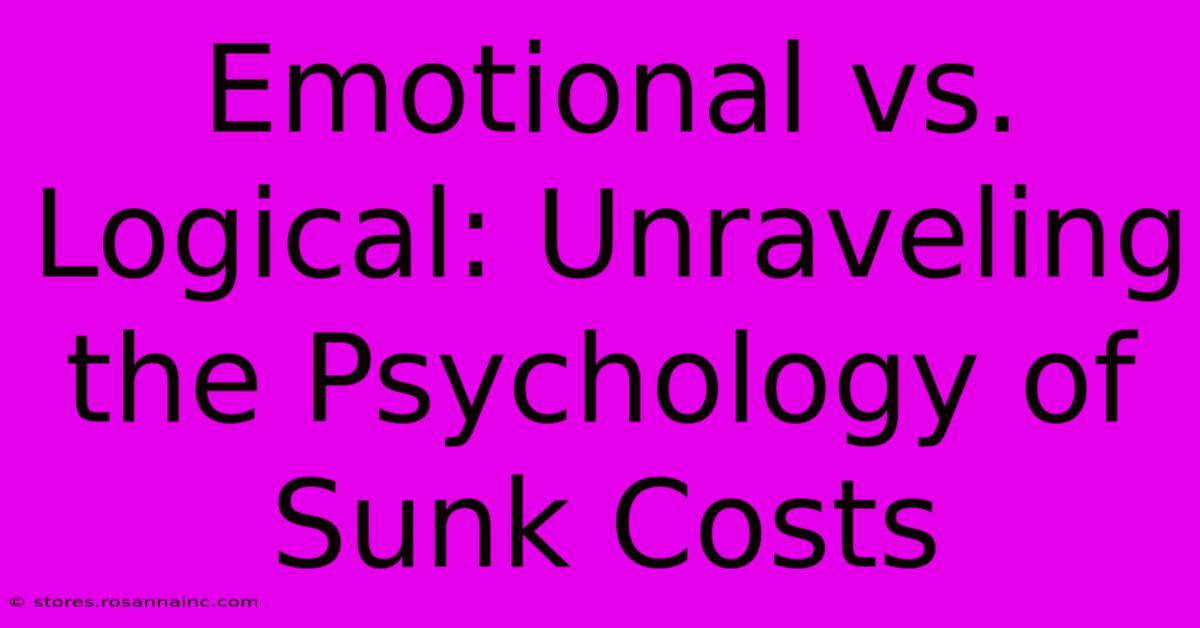Emotional Vs. Logical: Unraveling The Psychology Of Sunk Costs

Table of Contents
Emotional vs. Logical: Unraveling the Psychology of Sunk Costs
The human experience is a fascinating blend of logic and emotion. Often, these two forces work in harmony, guiding our decisions toward rational outcomes. However, sometimes they clash, leading to choices that defy logic and even harm our own interests. A prime example of this conflict lies in the psychological phenomenon known as sunk cost fallacy. Understanding the interplay of emotion and logic in sunk cost decisions is crucial to making better choices in our personal and professional lives.
What are Sunk Costs?
Before diving into the emotional and logical aspects, let's define sunk costs. Simply put, sunk costs are investments – time, money, effort – that have already been made and cannot be recovered. These past investments should, logically, have no bearing on future decisions. Yet, they often exert a powerful influence.
The Logical Approach: Cutting Your Losses
From a purely logical perspective, sunk costs are irrelevant. Consider this scenario: You've spent $100 on tickets to a concert. On the night of the concert, you feel unwell. Logically, the $100 is gone regardless of whether you attend. The rational decision is to stay home and recover, avoiding further wasted time and energy feeling miserable at a concert you don't want to attend. Ignoring sunk costs allows for optimal decision-making based on present circumstances.
Why Logic Often Fails:
The reality is, most people don't act logically in such situations. The sunk cost fallacy compels many to attend the concert despite feeling unwell, clinging to the justification that "I've already paid for the tickets." This is where emotion enters the equation.
The Emotional Pull: Justification and Regret Avoidance
Our emotional responses play a significant role in our adherence to the sunk cost fallacy. Several factors contribute to this:
- Regret Aversion: The fear of regretting a past decision fuels the sunk cost fallacy. Attending the concert, despite feeling ill, may be seen as a way to avoid the regret of "wasting" the $100.
- Justification of Past Decisions: We often strive to justify our past choices, even if those choices were initially flawed. Continuing to invest in a failing project, simply because of significant prior investment, is a classic example. This desire for self-justification overrides rational consideration of future outcomes.
- Cognitive Dissonance: The discomfort of acknowledging a poor decision (e.g., buying the concert tickets) leads us to double down, rather than admit the mistake. This is a manifestation of cognitive dissonance, the mental discomfort experienced when holding conflicting beliefs.
Emotional vs. Logical Decision Making: A Case Study
Let's consider a more substantial example: a failing business. The owner has poured years of effort and significant capital into the venture. Logically, if projections show no path to profitability, the rational course is to cut losses and move on. Emotionally, however, letting go of the "sunk cost" (time, money, and emotional investment) is incredibly difficult. The emotional attachment makes it hard to accept failure and often leads to prolonging the inevitable, resulting in further losses.
Overcoming the Sunk Cost Fallacy
Recognizing the emotional drivers behind the sunk cost fallacy is the first step to overcoming it. Here are some strategies to foster more rational decision-making:
- Practice Mindfulness: Pay attention to your feelings and thoughts, especially when facing a sunk cost decision. Acknowledge the emotional pull but don't let it dictate your actions.
- Focus on Future Outcomes: Shift your attention away from past investments and concentrate on the potential gains and losses of future choices. What's the best course of action going forward, regardless of past spending?
- Seek External Perspectives: Discuss your situation with a trusted friend, family member, or advisor. An outside perspective can help you see the situation more objectively.
- Embrace Imperfection: Accepting that mistakes are inevitable and learning from them is crucial. Holding onto past investments to avoid feeling regret can lead to greater losses down the line.
Conclusion: The Power of Rationality
The sunk cost fallacy vividly illustrates the power of emotion over logic in decision-making. By understanding the interplay of these forces, and actively employing strategies to minimize the influence of sunk costs, you can make more rational choices that align with your long-term interests and well-being. Remember, letting go of past investments isn't admitting defeat; it's often a crucial step toward future success.

Thank you for visiting our website wich cover about Emotional Vs. Logical: Unraveling The Psychology Of Sunk Costs. We hope the information provided has been useful to you. Feel free to contact us if you have any questions or need further assistance. See you next time and dont miss to bookmark.
Featured Posts
-
Forget The Dentist Dnd Gel 861 Make Home Dental Care A Breeze
Feb 04, 2025
-
Discover 0 E194 B The Hex Code That Unlocks Captivating Designs
Feb 04, 2025
-
Discover Austins Hidden Gem The Unbelievable Luxury Of Perry Homes
Feb 04, 2025
-
Floral Extravaganza The Ultimate Guide To Christmas Flowers For Every Home And Style
Feb 04, 2025
-
Customize Your Corner Of The Web How To Tailor Your Settings For Maximum Comfort
Feb 04, 2025
